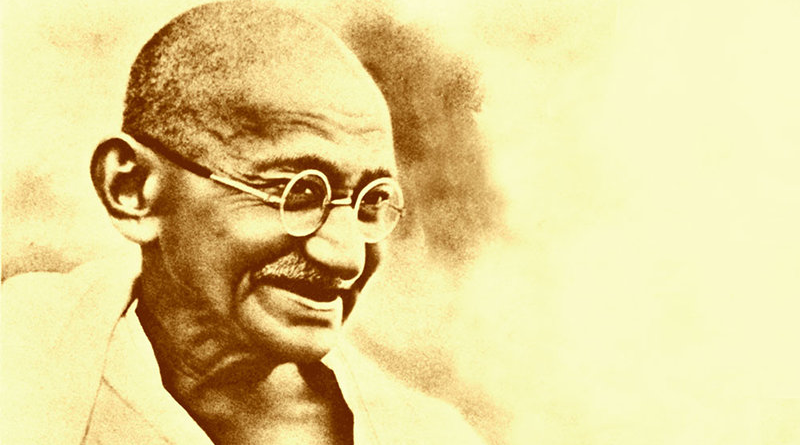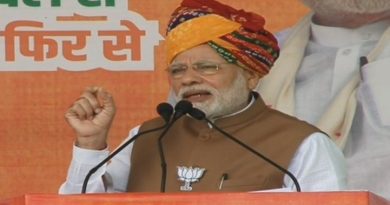REMEMBERING Mahatma Gandhi
It was on 30 January 1948 Mahatma succumbed to the bullets while he was on his way to the daily prayers. Though he left us physically, his teachings, numerous experiments in his personal life, politics and philosophy is fresh among the minds of people in India and other countries of the world. Why is he remembered in every nook and corners of the world? What aspects of his philosophy are attractive enough to lure youngsters into Gandhian fold? His life has become a model for those who are keen to practice the non violence at various levels among individuals and governments. The first thing that one remembers Mahatma Gandhi is that of a thin bespectacled man clad with one piece of cloth walking confidently with his stick or sitting quietly in front of Charkha spinning. This simplicity is the signature of his living and teachings. The most important aspect of his life is that there was no difference between what he taught and what he practiced. Therefore he said “be the change you want to see in the world”, which literally means that instead of dreaming or speaking about the change, it must begin from the individual.
One of the foundations of his thought was non-violence. It was not just at the philosophical and mental level, but to be put into practice at personal and community levels in everyday life. It was not just a hollow principle to be followed by fellow human beings, but it meant to respect other creatures in nature like insects and animals. Though he is remembered as a great leader to put the tools of non violent into use as a political strategy to win independence from the British rule, he felt that this needs to be part of common man’s life to end exploitation among the family and in the society. Gandhi was the first modern pacifist, and he coined the word Pacifism, which means non violent opposition to war, militarism and violence. This is also known as ‘Satyagraha”, one of the main tools that led to winning the independence from colonial rule. To achieve this he asked for practice forgiveness instead of spreading hate. He said that “forgiveness is the attribute of the strong and those who are weak can never forgive”. Therefore he respected even his enemies, and appealed to the goodwill present among the enemies and gradually was able to win them with his persuasion. That is the reason for many British people were supporting Gandhi despite British Raj being the staunch enemy. There was no hatred in his mind against his detractors or those who criticised his ideas and acts. For him taking revenge is like spreading the poison, to practice an eye for eye would make the whole world blind. His life was an experiment with truth and non violence in which he was constantly learning form situations and people. His quote is” live as if you die tomorrow and learn as if you were to live forever”. He learnt from his mistakes, improving on his strategies and making his ideas more effective. It is a phenomenal feat that he wrote 55000 pages, which is produced in 100 volumes of collected works by the government of India. We need to remember that he wrote this by hand, when there were no computers. In remembering Gandhi the present government is trying to put his ideas into practice. The launching of the cleanliness campaign under the banner of Swach Bharat Ahiyaan(SBA)is inspired by his idea. It has created awareness among the masses and gradually the people are adapting, changing their age old habits and practicing the concept of cleanliness in daily life. The emphasis on reviving the age old Khadi cloth among the younger generation is another area in which the Prime Minister has taken personal interest and he has appealed to people to support Khadi by purchasing it and wearing it regularly. Gandhi’s philosophy of simple living is the basis for low carbon footprint life style to address the issue of climate change and global warming. Remembering this aspect of Gandhi the Central Government signed the Climate Change Agreement on Gandhi’s birthday. Thus, Gandhi is alive through his ideas both at national and international levels. At national level the launching of non violent Chipko – Appiko Movement to protect the forest resources was inspired by Gandhi’s ideas and led by Sarvodaya leaders like Padma Vibhushan Shri Sunderlal Bahuguna.At international level Nelson Mandela followed Gandhi’s philosophy to end the apartheid rule in South Africa. Similarly, Martin Luther King Jr in USA and much other practiced non-violence are carrying forward their struggles for justice. It will be appropriate to recall his words on the death anniversary” So long as my faith burns bright, as I hope it will , even if I stand alone, I shall be alive in the grave and what is more speaking form it”. That is literally true, his ideas are resonating across the world and the creed is growing. On his 69th death anniversary we need to remember Gandhi’s ideas by putting them into practice in our daily lives. This is the only way we can pay the due respects to the Father of the Nation.
*****
(Author is an independent journalist and columnist based in Karnataka. Views expressed in the article are personal).




